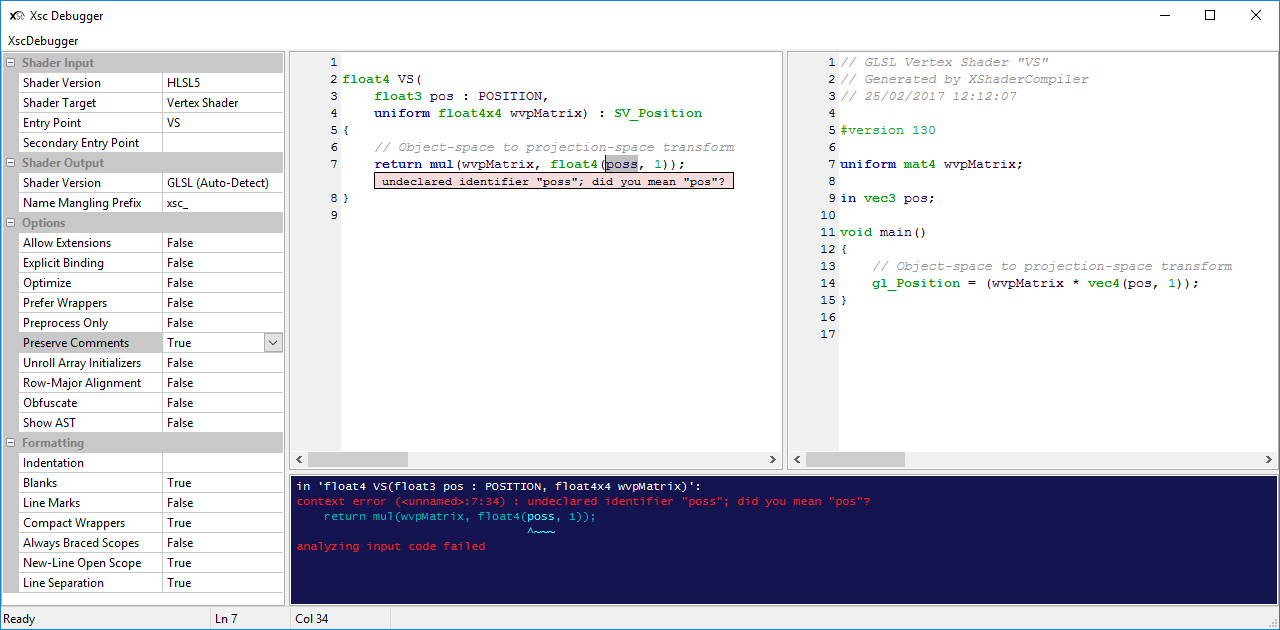- Cross compiles HLSL shader code (Shader Model 4 and 5) into GLSL
- Simple to integrate into other projects
- Low overhead translation (i.e. avoidance of unnecessary wrapper functions)
- Dead code removal
- Code reflection
- Meaningful report output
- Commentary preserving
- Written in C++11
- C Wrapper (ISO C99)
- C# Wrapper
3-Clause BSD License
Version: 0.10 Alpha (Do not use in production code!)
See the TODO.md file for more information.
| Feature | Progress | Remarks |
|---|---|---|
| Vertex Shader | ~80% | Few language features are still left |
| Tessellation Control Shader | ~20% | InputPatch and patch-constant-function translation in progress |
| Tessellation Evaluation Shader | ~20% | OutputPatch translation in progress |
| Geometry Shader | ~60% | Code generation is incomplete |
| Fragment Shader | ~80% | Few language features are still left |
| Compute Shader | ~80% | Few language features are still left |
The following command line translates the "Example.hlsl" file with the vertex shader entry point "VS", and the fragment shader entry point "PS":
xsc -E VS -T vert Example.hlsl -E PS -T frag Example.hlsl
The result are two GLSL shader files: "Example.VS.vert" and "Example.PS.frag".
#include <Xsc/Xsc.h>
#include <fstream>
#include <iostream>
int main()
{
// Input file stream (use std::stringstream for in-code shaders).
auto inputStream = std::make_shared<std::ifstream>("Example.hlsl");
// Output file stream (GLSL vertex shader)
std::ofstream outputStream("Example.VS.vert");
// Fill the shader input descriptor structure
Xsc::ShaderInput inputDesc;
inputDesc.sourceCode = inputStream;
inputDesc.shaderVersion = Xsc::InputShaderVersion::HLSL5;
inputDesc.entryPoint = "VS";
inputDesc.shaderTarget = Xsc::ShaderTarget::VertexShader;
// Fill the shader output descriptor structure
// Use outputDesc.options, outputDesc.formatting, and outputDesc.nameMangling for more settings
Xsc::ShaderOutput outputDesc;
outputDesc.sourceCode = &outputStream;
// Optional output log (can also be a custom class)
Xsc::StdLog log;
// Optional shader reflection data (for shader code feedback)
Xsc::Reflection::ReflectionData reflectData;
// Translate HLSL code into GLSL
try
{
bool result = Xsc::CompileShader(inputDesc, outputDesc, &log, &reflectData);
}
catch (const std::exception& e)
{
std::cerr << e.what() << std::endl;
}
return 0;
}using System;
using System.IO;
namespace Example
{
class Program
{
static void Main()
{
// Create instance of the XShaderCompiler
var compiler = new XscCompiler();
// Fill the shader input descriptor structure
var inputDesc = new XscCompiler.ShaderInput();
inputDesc.SourceCode = File.ReadAllText("Example.hlsl");
inputDesc.ShaderVersion = XscCompiler.InputShaderVersion.HLSL5;
inputDesc.EntryPoint = "VS";
inputDesc.Target = XscCompiler.ShaderTarget.VertexShader;
// Fill the shader output descriptor structure
// Use outputDesc.Options, outputDesc.Formatting, and outputDesc.MameMangling for more settings
var outputDesc = new XscCompiler.ShaderOutput();
// Optional output log (can also be a custom class)
var log = compiler.StandardLog;
// Optional shader reflection data (for shader code feedback)
var reflectData = new XscCompiler.ReflectionData();
// Translate HLSL code into GLSL
try
{
bool result = compiler.CompileShader(inputDesc, outputDesc, log, reflectData);
if (result)
{
// Write output shader code
File.WriteAllText("Example.VS.vert", outputDesc.SourceCode);
}
}
catch (Exception e)
{
Console.WriteLine(e);
}
}
}
}A real-time debugger with UI is provided. Although this debugger is mainly used for developement of the compiler itself, it can also be used for a quick translation overview, to see how language constructs are being cross compiled.
Example of the real-time debugger (requires wxWidgets 3.1.0 or later):
Here is a brief outline of High-Level differences between HLSL and GLSL, which XShaderCompiler is able to translate properly:
| Feature | HLSL | GLSL |
|---|---|---|
| Separation of Textures and Samplers | Yes | Only for Vulkan |
| Structure Inheritance | Yes | No |
| Nested Structures | Yes | No |
| Anonymous Structures | Yes | No |
| Structure Member Functions | Yes | No |
| Default Parameters | Yes | No |
| Object-Oriented Intrinsics | Yes | No |
| Multiple Entry Points | Yes | No |
| Type Aliasing | Yes | No |
| L-Values of Input Semantics | Yes | No |
| Implicit Type Conversion | Extensive | Restricted |

